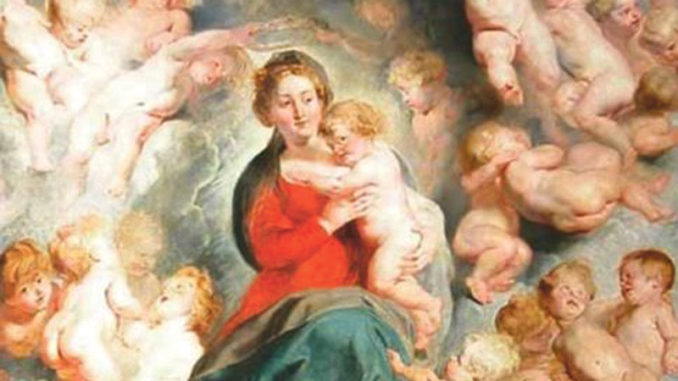
This is the season when children’s Christmas plays warm our souls. Little angels wearing tinsel halos and wings announce “Peace on earth” — possibly with a lisp. Tykes bearing makeshift shepherd staffs (sometimes fashioned from a grandparent’s cane) pull toy sheep and cuddle stuffed lambs. Advent is our season of longing, and these children represent some of our deepest longings: a return to innocence, peace on earth, lasting love, eternal happiness.
In the midst of our star-struck glow, however, we find that murder and mayhem persist. Politics is literally fetid, people starve, and enmities are stoked. It was this way in the time of Christ, too.
Mary and Joseph certainly knew of the brutality of oppressive government. Herod the Great was famous for arranging the executions of blood relatives and anyone else he imagined might usurp his power — including the Holy Innocents of Bethlehem. The Romans devised the most gruesome tortures to subjugate and terrorize the populace. In addition to cruel rulers, there were robbers on the roadways to Samaria and Galilee and zealots who would readily resort to violence to bring down the government.
We would love to think that the coming of the Messiah would have quelled all that forever. Yet humans’ wills remain free. So God’s sovereignty can be resisted, and people can choose self-absorption and malice rather than compassion and concern for the common good. We can love and forgive or clench our fists in hatred and prejudice.
Prayer certainly can overcome grave ills. So too can action steps, even if they seem to be small ones. Formation days and dialogues recently held in our diocese have focused on building interracial and inter-cultural bridges. We have talked about how to reach youth and young adults and how to celebrate diverse cultures. The Fellowship of South Carolina Bishops is recommending book studies that will help people walk in one another’s shoes and to see how people can live in the same cities and towns and share the same events but experience them in entirely different ways — including ways that are discriminatory and belittling.
The United States Conference of Catholic Bishops in 2018 issued a pastoral letter against racism, entitled “Open Wide Our Hearts” (borrowing from a statement of St. Katharine Drexel). It sheds light on how racism has affected Native Americans, African Americans, and Hispanic Americans. We might also add Asian Americans. The pastoral letter is easily accessible on the USCCB website and is good background for interracial dialogue.
Aside from inviting parishioners to reflect on book studies, followers of Jesus are being urged to invite colleagues and neighbors who might be deemed “other” to lunch, a picnic, a social, or to church.
We may not individually or collectively solve the current strife over immigration, racial profiling, crime in the streets, or international conflicts, but we may find that taking some small steps toward understanding softens our hearts and widens our embrace. We will put genuine meaning into that line we so often sing: “Let there be peace on earth and let it begin with me.”

